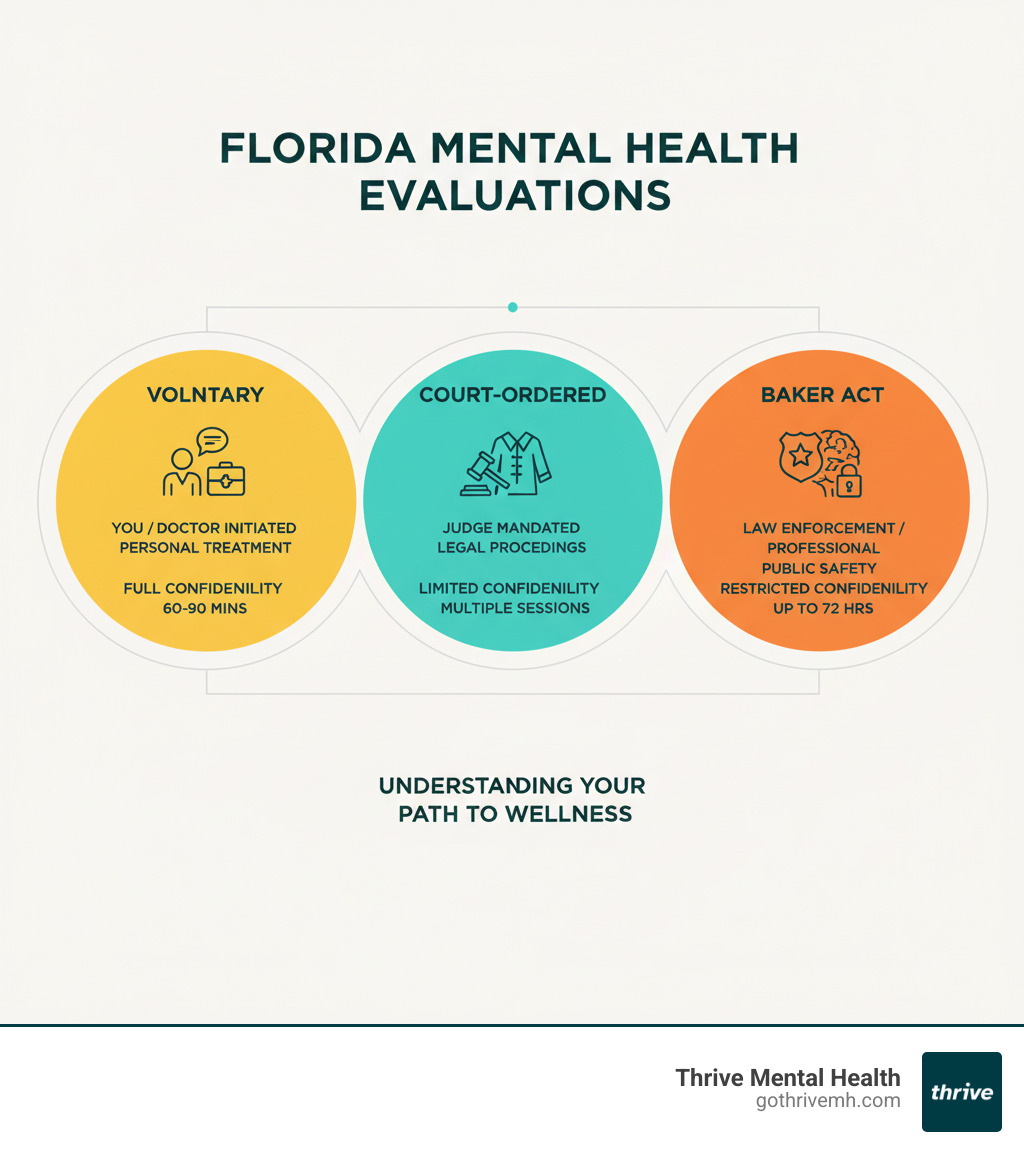Florida Mental Health Evaluations Explained (Without the Legalese)

Mental Health Evaluation Florida: Costs, Your Rights, and 72‑Hour Next Steps [2025]
If youre in crisis, call/text 988 right now. You are not alone.
Need a mental health evaluation Florida? This guide shows what it costs, how fast it happens (including the 72-hour Baker Act window), what a0to expect, and your rights a0 so you avoid costly mistakes and get the right care fast.
If you need a mental health evaluation Florida, the process can feel confusing. Whether it’s voluntary or court-ordered, understanding how evaluations work can reduce anxiety and ensure you get the right care.
Quick Overview: Mental Health Evaluation Florida Types
| Type | Who Orders It | Confidential? | Duration |
|---|---|---|---|
| Voluntary | You or your doctor | Yes (standard privacy) | 60-90 minutes |
| Court-Ordered | Judge | No (shared with court) | Multiple sessions |
| Baker Act | Law enforcement/professionals | Limited | Up to 72 hours |
The process varies dramatically depending on the reason for the evaluation. A voluntary assessment for personal insight is very different from a court-mandated one for legal proceedings. Florida’s Baker Act also allows involuntary examinations when someone poses a risk to themselves or others.
Common reasons for evaluations in Florida:
- Personal mental health concerns
- Doctor referrals for treatment planning
- Criminal court cases (competency)
- Civil lawsuits (psychological damages)
- Guardianship hearings
- Child custody disputes
- School or workplace accommodations
I’m Anna Green, LMHC, LPC. With over a decade of experience in complex mental health situations, including court-ordered evaluations, I’ve seen how understanding the process transforms an overwhelming mental health evaluation Florida experience into a clear path forward.

Mental health evaluation Florida vocab to learn:
Mental Health Evaluation Florida: What It Is, When You Need One, and What You a0Get

A mental health evaluation Florida is a thorough check-up for your mind. It’s a diagnostic tool that helps professionals understand your thoughts, feelings, and behaviors to assess your psychological well-being. A trained professional assesses how you think, feel, and function to identify patterns or symptoms affecting your mental health.
You might seek an evaluation for personal concerns, a doctor’s referral, or due to legal requirements. The impact of mental health on daily life is significant, and an evaluation is the first step toward proper treatment planning. For more insight, see our guide on Understanding the Impact of Mental Disorders on Daily Life.
Standard vs. Court-Ordered Evaluations
The type of evaluation you get changes everything, from confidentiality to whether you have a choice in participating.
A standard evaluation is a voluntary process focused on your well-being and treatment. Your information is protected by standard doctor-patient privacy rules.
Court-ordered evaluations are mandated by a judge for legal proceedings. The purpose is to provide the court with an expert opinion on your mental state, not to provide treatment. Your conversations are not private and will be shared with the court. The typical doctor-patient relationship does not apply.
| Feature | Standard (Voluntary) Evaluation | Court-Ordered Evaluation |
|---|---|---|
| Purpose | Treatment planning, personal insight | Legal decision-making for court |
| Confidentiality | Full privacy protection | Shared with court and legal parties |
| Who Receives Report | You and your treatment team | Judge, attorneys, legal parties |
| Voluntariness | Completely voluntary | Required by court order |
When is a mental health evaluation in Florida necessary?
Beyond personal insight or a professional recommendation, several legal situations require evaluations in Florida:
- Criminal cases: To determine competency to stand trial or if mental illness was a factor in the alleged crime.
- Civil lawsuits: To assess psychological damages from events like an accident or harassment.
- Guardianship hearings: To assess if someone can make their own financial or health decisions.
- Family court: In custody cases, to evaluate parents or children to ensure a safe environment.
- School accommodations: To identify learning disabilities or ADHD affecting academic performance.
- Workplace requirements: For fitness-for-duty evaluations, especially in safety-sensitive jobs.
Understanding the process is critical, as the stakes in these situations can be high, affecting your freedom, parental rights, or career.
Court-Ordered Mental Health Evaluation Florida: What Happens, Your Rights, and the 72-Hour Timeline

A court-ordered mental health evaluation Florida is a legal mandate, not a suggestion. These evaluations help courts make informed decisions while balancing public safety and individual rights. Florida’s Baker Act (Chapter 394 of the Florida Statutes) provides the legal framework for these evaluations. Understanding the process can reduce anxiety and help you prepare. You can review the legal requirements at Chapter 394 Section 463 – 2024 Florida Statutes.
Unlike voluntary evaluations, court-ordered assessments serve the legal system’s need for expert opinions to answer specific legal questions.
Who Can Initiate an Involuntary Examination?
If you a0re in crisis, call/text 988 right now. You are not alone.
Under Florida’s Baker Act, an involuntary examination can be initiated only if a person has a mental illness and poses a threat to themselves or others. The following can initiate the process:
- Law enforcement officers can transport a person to a receiving facility for evaluation.
- Circuit or county court judges can issue an ex parte order based on sworn testimony.
- Qualified mental health professionals (physicians, clinical psychologists, psychiatric nurses, LMHCs, LCSWs) can initiate the process if they have examined the person within the last 48 hours.
The criteria are strict: there must be evidence that the person has refused a voluntary exam and, without care, is likely to self-neglect or cause serious harm to themselves or others.
What Happens During the Evaluation?
At a receiving facility, a structured process begins to gather information about your mental state.
- Information Gathering: A professional conducts a clinical interview about your symptoms, history, and recent events. They may also speak with family or review school records for minors.
- Psychological Testing: You may undergo assessments (not pass-or-fail tests) to identify conditions like anxiety, depression, or ADHD.
- Record Review: The evaluator will review medical, psychiatric, or legal documents for a complete picture.
- Duration: A standard evaluation is 60-90 minutes, but court-ordered evaluations often require multiple sessions over several hours. Under the Baker Act, there is a 72-hour hold period for assessment.
- Risk Assessment: A professional evaluates your risk of harm to yourself or others, which informs their recommendations.
- Diagnosis Formulation: The evaluator determines if you meet the criteria for a mental health condition (e.g., per the DSM-5) and includes this in their report to the court.
During the 72-hour hold, you will either be released, released with a plan for voluntary outpatient treatment, asked to consent to inpatient treatment, or a petition for involuntary services will be filed. Many find that approaches like Cognitive Behavioral Therapy (CBT) are helpful after an evaluation.
Confidentiality and Your Rights in a Court-Ordered Setting
In a court-ordered evaluation, the rules of privacy change. Confidentiality is limited because the evaluator serves as an expert for the court, not as your personal therapist. The evaluator must explain this before the assessment begins.
- Report for the Court: The primary purpose is to create a report for the judge and attorneys, detailing findings and opinions relevant to the legal questions.
- Informed Consent: While you have rights, participation is mandated by the court. Refusing to participate can lead to legal consequences, like being held in contempt of court.
- Right to Understand: You have the right to know the evaluation’s purpose and what legal questions it will address.
- Attorney’s Role: Your attorney is a crucial advocate. They can help you understand your rights and how the evaluation might impact your case.
- This Isn’t Therapy: The evaluator’s job is to assess and report, not provide counseling during the evaluation.
Find a Mental Health Evaluation in Florida: Costs, Insurance, and Fast Telehealth Options

Looking for a mental health evaluation Florida can feel overwhelming when you’re already stressed. The good news? It’s more straightforward than you might think, and you have more options than ever before.
While state-funded services offer affordable, income-based options, private practices like Thrive Mental Health provide greater flexibility and specialized assessments. We offer comprehensive evaluations across our Florida service areas, including South Florida, St. Petersburg, and Central Florida, for everything from personal insight to complex legal matters. Our goal is to connect you with the right professional quickly and conveniently.
Telehealth options are revolutionizing access to mental health care across Florida. Virtual evaluations eliminate barriers like travel time and transportation costs, making it easier to connect with the right professional regardless of where you live in the state.
Costs and Insurance for a mental health evaluation Florida
The cost of a mental health evaluation Florida varies widely depending on what you need. A standard psychiatric evaluation typically runs between $200 and $500 for a basic assessment. However, comprehensive forensic evaluations for legal cases can cost several thousand dollars due to the extensive testing, detailed report writing, and potential court testimony required.
Don’t panic about the price tag. Most health insurance plans cover mental health services, including evaluations. We work with major Florida insurers including Florida Blue, Cigna, Aetna, UnitedHealthcare, and Optum. Each plan has different coverage levels, so it’s worth calling your insurance company to understand your specific benefits. Check out our Insurance Companies page for detailed information about working with different providers.
Medicaid recipients have excellent options too. Services with a Medicaid Covered Psychiatrist ensure you can get the evaluation you need without financial strain.
If you’re paying out-of-pocket, don’t give up. Many providers offer sliding scale fees based on income, and some organizations provide pro bono or reduced-cost services. Always ask about payment options during your initial consultation most professionals want to help you get the care you need.
Accessing Evaluations via Telehealth
Virtual evaluations have transformed how we access mental health care in Florida. You can connect with qualified professionals from your living room, eliminating the stress of commuting to appointments and finding parking in busy areas like downtown Miami or Tampa.
This convenience is especially valuable across Florida’s diverse geography. Whether you’re in St. Petersburg, Orlando, or the Florida Keys, telehealth puts specialized evaluators within reach. You no longer need to drive hours to find the right professional for your specific needs.
At Thrive, we’ve embraced virtual care because it works. Our telehealth services extend beyond Florida to Indiana (including Indianapolis and Fort Wayne) and California (Sacramento, Los Angeles, and San Diego). This broad reach means you get high-quality, evidence-based care regardless of your location.
Virtual evaluations maintain the same clinical standards as in-person assessments while offering greater privacy and convenience. You can schedule around your work commitments and avoid the anxiety some people feel about visiting a clinical setting. Learn more about the benefits in our guide on Virtual Therapy: A Convenient and Effective Approach to Counseling.
The flexibility of telehealth makes it easier to fit mental health care into your life, rather than rearranging your entire schedule around an appointment.
After Your Mental Health Evaluation: Next Steps That Actually Help
Getting the results of your mental health evaluation Florida can feel overwhelming maybe relieving, maybe scary, probably a mix of both. Whatever emotions come up, know that this moment is actually the beginning of real change, not the end of your story.
Your evaluation report isn’t just a collection of clinical terms and recommendations. It’s a roadmap that finally explains why you’ve been struggling and, more importantly, shows you exactly how to move forward. Take time to read through it carefully, and don’t leave your follow-up appointment until every question is answered.
The real magic happens in treatment planning and this isn’t something done to you, it’s something we do with you. Your therapist will work alongside you to turn those evaluation insights into concrete, achievable goals. We believe in personalized, whole-person care designed for long-term healing, not quick fixes. For a deeper dive into effective treatment planning, check out our guide on Key Elements of Successful Rehab Treatment Plans.
Treatment Options and Support
Your mental health evaluation Florida opens doors to treatment options you might not have known existed. The key is finding the right level of support for where you are right now not too little, not too much, but just what you need to thrive.
Individual therapy gives you that one-on-one space to process everything that’s been weighing on you. It’s where you develop real coping strategies and work through challenges at your own pace. For some people, medication management with a psychiatrist or psychiatric nurse practitioner becomes part of the picture, helping to ease symptoms so therapy can be more effective.
When weekly therapy isn’t quite enough, Intensive Outpatient Programs (IOP) step in with several hours of structured support multiple days per week. You get the intensity you need while still sleeping in your own bed and maintaining your routine. Our comprehensive Intensive Outpatient Programs (IOP): Complete Guide explains exactly how these programs work.
For those needing even more support, Partial Hospitalization Programs (PHP) provide comprehensive daily treatment think of it as intensive care for your mental health, but you go home each evening. Learn more about our PHP Mental Health Services.
Here’s what makes Thrive different: we offer both virtual and in-person options for IOP and PHP programs. Our virtual programs mean you can access expert-led, evidence-based care from anywhere whether you’re in South Florida, California, or Indiana. This flexibility is especially valuable for busy professionals who need treatment that fits their schedule. Check out our Virtual IOP South Florida services to see how convenient quality care can be.
The right treatment isn’t about checking boxes it’s about finding what actually works for your life, your schedule, and your goals. We’re here to help you figure that out, one step at a time.
Mental Health Evaluation Florida: FAQs [People Also Ask]
How long does a mental health evaluation take in Florida?
A standard psychiatric evaluation for personal reasons typically lasts 60 to 90 minutes. A court-ordered or forensic mental health evaluation Florida is more comprehensive, often taking several hours over multiple sessions. An involuntary examination under Florida’s Baker Act involves an assessment period of up to 72 hours.
Is a court-ordered mental health evaluation confidential?
No. A court-ordered mental health evaluation Florida is not confidential like a typical doctor’s visit. Its purpose is to provide information to the court. The evaluator must explain this, and the final report is shared with the judge and attorneys.
Can I refuse a court-ordered mental health evaluation?
Refusing a court-ordered mental health evaluation Florida can lead to serious legal consequences, including contempt of court. If you have concerns, talk to your attorney immediately.
How much does a mental health evaluation cost in Florida?
A standard evaluation may cost between $200 and $500, while comprehensive forensic evaluations can cost several thousand dollars. Many plans including Florida Blue, Cigna, Aetna, UnitedHealthcare, and Optum cover evaluations. Medicaid recipients have options with Medicaid covered psychiatrists. For court-ordered evaluations, ask your attorney who pays.
Suggested FAQ schema (JSON-LD):
Mental Health Evaluation Florida: Key Takeaways + Fast Next Steps
Finding clarity about your mental health shouldn’t feel like solving a puzzle with missing pieces. Throughout this guide, we’ve walked through the ins and outs of mental health evaluation Florida processes from understanding the difference between voluntary assessments and court-ordered evaluations to navigating the Baker Act and finding affordable care options.
The key takeaway? Knowledge is power. Whether you’re seeking personal insight, fulfilling a legal requirement, or supporting someone you care about, understanding your rights and options transforms what feels overwhelming into manageable steps forward.
A mental health evaluation Florida is rarely the final destination it’s usually the starting point for meaningful change. The diagnosis or insights you receive become the foundation for personalized treatment, whether that’s individual therapy, medication management, or more intensive support through programs like our virtual IOP and PHP options.
Your mental health journey is uniquely yours. Some people thrive with weekly therapy sessions, while others benefit from the structured support of intensive outpatient programs. The flexibility of virtual care means you can access expert-led, evidence-based treatment from anywhere in Florida or beyond fitting seamlessly into your life and schedule.
Don’t let uncertainty keep you stuck. The mental health professionals conducting these evaluations are there to help, not judge. They understand that seeking evaluation takes courage, and they’re committed to providing you with the insights and recommendations you need to move forward with confidence.
Ready for support? Thrive offers virtual and hybrid IOP/PHP with evening options. Verify your insurance in 2 minutes (no obligation) a0Start benefits check or call 561-203-6085. If you’re in crisis, call/text 988.